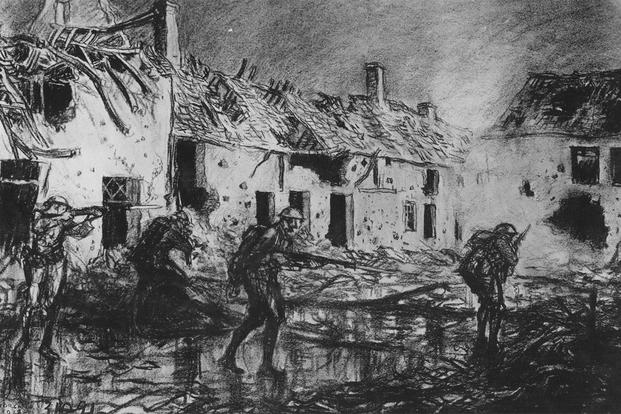Ever since World War I, superior force is no longer measured in terms of men or horses, but in the means to wreak destruction.
-- Saul David
More than a century ago, in 1914, war broke out on an international scale as 30 countries declared war or joined the war on behalf of an ally, resulting in the First World War. Although the United States initially declared itself to be neutral, it would enter the war after Germany's attempt at isolating Britain, one of the U.S.'s closest trading partners. On April 2, 1917, U.S. President Woodrow Wilson appeared before Congress and asked for a declaration of war against Germany. "The world must be made safe for democracy. Its peace must be planted upon the tested foundations of political liberty," he said. Four days later, following votes by the U.S. Senate and House of Representatives, the United States formally entered World War I as an associated power in support of France, Great Britain and Russia.
The "war to end all wars" was not only memorable for the sheer geographical scale on which fighting took place, but also for the massive losses of life, and the role new technology played during the conflict. Reconnaissance reviewed photographs of enemy fortifications, better weapons drastically improved the ability to kill the enemy, and troops from opposing countries dug down into trenches for protection from new artillery. Flying aces took to the skies, and newly formed tank battalions and battleships brought massive firepower.
The impact of the war was far-reaching. At the close of the war, formerly close countries like Russia and Germany were now enemies, and former enemies such as France and Russia were allied. The League of Nations, forerunner to the United Nations, was formed and later failed. The Austro-Hungarian Empire collapsed, and a wave of political revolutions would cover the globe, overtaking Russia, Germany and Hungary.
At the 11th hour on the 11th day of the 11th month of 1918, the Great War ended. At 5 a.m. that morning, Germany, short on manpower and supplies and faced with imminent invasion, signed an armistice agreement with the Allies in a railroad car outside Compiégne, France. The cost of the Great War was heavy for all the countries involved, with 16 million civilians and military members dead, and 21 million wounded.
For more features and veteran stories from World War I, see the links below.
World War I: The Question of Blame
Who was to blame for the First World War? The history books offer us no shortage of candidates.
From Waterloo to the Marne: The Road to World War I
Waterloo and the Marne are separated by 180 miles and a century of history and politics that eventually led to the outbreak of World War I.
World War I: The Schlieffen Plan
The German strategy to fight on two fronts against France and Russia would determine the scope and intensity of combat in World War I.
World War I Commemoration Will Take Fresh Look at Gen. Pershing
The centennial of the United States' entry into that war will be modestly commemorated this year, with a big Missouri twist.
Alvin York
"God would never be cruel enough to create a cyclone as terrible as that Argonne battle. Only man would ever think of doing an awful thing like that."
John Cassell Henderson
"Nature deals life and death in her own way, so when Gabriel blows his horn, I'm ready. Better men than I have gone long before me. But as long as I'm still here, I'll try to look at it as Jackie Gleason might say, 'How sweet it is.'"
Lloyd Staley
"We are in the Army now. I am sitting inside our little old tent listening to the gentle patter of the raindrops on the canvas."
Sylvester Butler
"Don't feel that you must get sweet chocolate and things to send every time; naturally I have enjoyed them very much."
Want to Know More About the Military?
Be sure to get the latest news about the U.S. military, as well as critical info about how to join and all the benefits of service. Subscribe to Military.com and receive customized updates delivered straight to your inbox.















